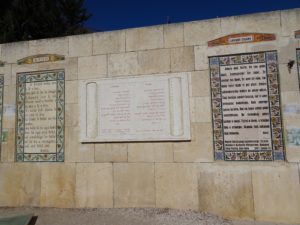THOUGHTS ON THE LORD’S PRAYER
Is the Lord’s Prayer actually a prayer? (The Lord’s Prayer, taught by Jesus, which starts “Our Father…”)
This seems a bizarre question to ask. People have been praying the Lord’sPrayer for centuries. How can it not be a prayer?

The Lord’s Prayer in Hebrew and Aramaic and over 160 other languages, Church of the Pater Noster, Mount of Olives, Jerusalem.
The question came alive for me in one incident a few years ago. I was in a mixed group discussion which we ended by saying the Lord’s Prayer. There were several Jews in that meeting and I wondered how it came across to them. I thought that there was nothing in the wording which would offend them, though the fact that it was the Christian prayer par excellence might make it offensive. But then I looked again at the actual words, and realised it was not a straightforward Jewish prayer, it was explicitly Jesus’ prayer. In fact, almost his manifesto. Let me explain.
(I take the Lord’s Prayer as recorded in Luke 11.2-4. This is much shorter than the one in Matthew, on which the church’s version is based, but has all the essential elements).
“Father” This is how Jesus constantly referred to God. It was known in Judaism, but rarely. Even ancient Greek and Roman religions knew it. I saw a play by Aeschylus called “The Suppliants” (c. 470 BC) about some female asylum seekers who constantly pray to “Father Zeus”. In fact “Jupiter is a corruption of the sanskrit words meaning ‘Father in heaven’. Nevertheless it was Jesus who made it the cornerstone of his, and our, relationship with God.
“Your kingdom come.” This was Jesus’ central message. Right at the start of his ministry his message is summed up by “the kingdom of God has come near” (Mark.15). It was the one overarching theme of his teaching. Of course masses of books have been written bout what Jesus meant by the phrase. I think that it is a dynamic concept of God in action defeating evil.
“Give us each day our daily bread.” This chimes in with Jesus warning against wealth and possessions and the worry which attaches to them. “So do not worry about tomorrow, for tomorrow will bring worries of its own.” (Matthew 6.34) The Pharisees, we are told were lovers of money, a kind of prosperity gospel. The Christian ideal was a simple lifestyle. “If we have food and clothing , we will be content with these. But those who want to be rich … are trapped by many senseless and harmful desires…” (1 Timothy 6.8-9)
“Forgive us our sins, for we ourselves forgive everyone indebted to us.” The call to radical forgiveness, e.g. turning the other cheek was perhaps the main plank of Jesus’ ethics. It stood out from the whole of his surrounding culture, Jewish, Greek or Roman. Only the early Buddhist book the Dhammapada has the same insistence on forgiveness.
“Do not bring us to the time of trial.” This is a plea to be saved for the horrors awaiting the Jewish nation/the whole world as human rebellion against God brings the inevitable catastrophe. “Nation will rise against nation, and kingdom against kingdom, there will be earthquakes in various places, there will be famines. This is but the beginning of the birthpangs.” (Mark 13.8)
Of course we do pay the Lord’s Prayer and we are absolutely right to do so. But it is helpful to realise that we are taking to ourselves all the essential elements of what Jesus taught.
But the Lord’s Prayer we use, based on Matthew 6.9-13, has about four mistranslations. So next week I will ask the question, What is wrong with the Lord’s Prayer?
